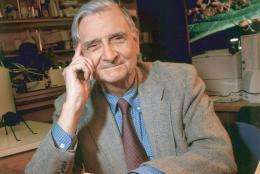Groups are the driving force of human evolution, Edward Wilson says

Plays well with others. There’s a reason that attribute is lauded, and it turns out to have evolutionary roots.
According to Pulitzer Prize-winning biologist Edward O. Wilson, groups are the driving evolutionary force of the human species. It’s the cooperators, the team players who set aside selfish desires for the good of the group, that outcompete groups of non-cooperators and ensure their genes are passed on to future generations.
It’s not just any group, though, Wilson told a packed Grand Hall at the Rice Memorial Center, where he gave the final presentation for this year’s President’s Lecture Series, “The Social Conquest of Earth,” April 3. The groups that survive and prosper generation after generation are the ones that are “eusocial,” he said. They live in multigenerational communities, have a reproductive division of labor and cooperatively care for their young and behave altruistically.
“There are countless thousands of animal species that form social groups, and some of them quite dramatic, but almost all fall short of eusociology,” Wilson said. “They lack a consistent division of reproduction, labor, cooperation, altruism.”
Eusociology happens rarely, and it’s a matter of luck, he said. Species proceed through the maze of evolution step by step, led by natural selection, generation by generation, and gradually, if the maze is traversed, they can go from primitively social creatures to something entirely different, he said.
Species become eusocial when a male and female cooperate to build a nest that it can defend and where it raises its young and provides for them. Only a small percentage of species step over the threshold and become eusocial, he said.
The first step humans took was walking upright, then using tools, then learning to use and control fire and adding meat to their diet. “Now they were beginning to gather together,” he said. “They were not wandering around the landscape going from food source to food source. Now they were at a campsite which they could defend and from which hunters went out.
“They were then faced with the opportunity and indeed the competitive necessity,” he said, “of communicating with one another over just how they were going to handle this arrangement that they had hit upon. ”
From there, they gained social intelligence, a psychological capacity for bonding and a language.
He said he believes the human condition evolved through an interaction of two levels of selection: individual, in which individuals compete with individuals in the same group on the basis of a certain trait subject to evolution and natural selection, and group — groups competing with other groups. How cooperative an individual is within a group determines how well the group can compete with other groups of different composition, he said.
“Very simply, within groups selfish individuals in the process of natural selection win over others,” he said. “Between groups, the group of altruists beats the selfish individuals.”
“I’m afraid that what made us human is the group selection that engendered social intelligence based upon selection between groups competing in an agreed cooperation, innovation and intelligence of their members and, above all, the ability of the individuals to cooperate and to create a social environment conducive to efficient action even at the cost of individual genetic selection.”
Known as the “father of sociobiology,” Wilson has made a giant contribution to understanding of the rich spectrum of Earth’s biodiversity. His works include two Pulitzer Prize winners — “The Ants” and “On Human Nature”; “The Future of Life,” which offers a plan for saving Earth’s biological heritage; and “The Creation,” a plea for science and religion to work together to save the planet. His newest book is “The Social Conquest of Earth.”
Previous speakers in this year’s series were Beverly Wright, an advocate for environmental justice and one of theGrio’s 100 “history makers in the making,” and Francisco Cigarroa, the first Hispanic to serve as chancellor of the University of Texas System.
Each year, the President’s Lecture Series brings to the Rice campus a variety of stimulating speakers on a range of topics. Rice offers the lecture series as a means of enhancing the intellectual life not only of the Rice community, but also of its neighbors throughout the city of Houston.
The President’s Lecture Series is sponsored by the Office of the President and is supported by the J. Newton Rayzor Lecture Fund.
Provided by Rice University

















